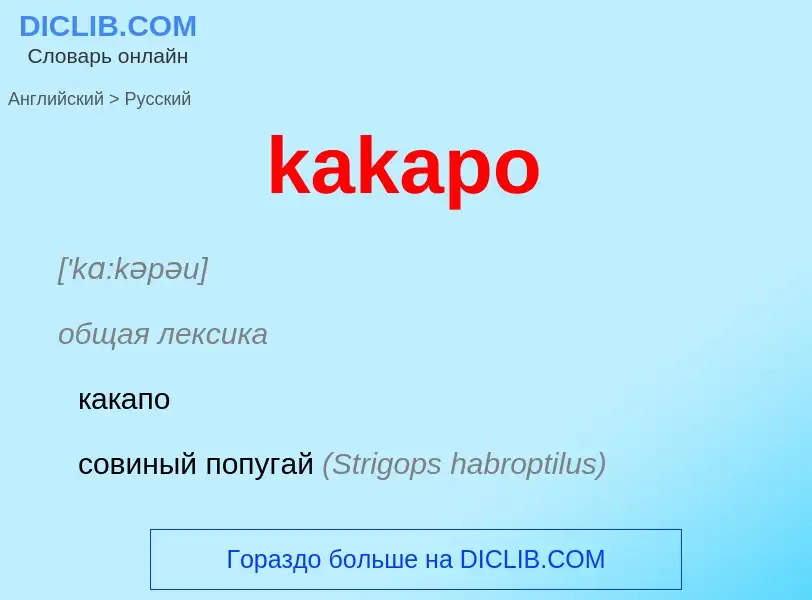Translation and analysis of words by ChatGPT artificial intelligence
On this page you can get a detailed analysis of a word or phrase, produced by the best artificial intelligence technology to date:
- how the word is used
- frequency of use
- it is used more often in oral or written speech
- word translation options
- usage examples (several phrases with translation)
- etymology
kakapo - translation to russian
['kɑ:kəpəu]
общая лексика
какапо
совиный попугай (Strigops habroptilus)
зоология
совиный попугай (Strigops habroptilus) (новозеландский)
существительное
зоология
какапо
(новозеландский) совиный попугай (Strigops habroptilus)
общая лексика
совиный попугай (попугайчик)
какапо (Strigops habroptilus)
Definition
Wikipedia

The kākāpō ( KAH-kə-poh; Māori: [kaːkaːpɔː]; from the Māori: kākāpō, lit. 'night parrot'), also known as owl parrot (Strigops habroptilus), is a species of large, flightless, nocturnal, ground-dwelling parrots of the super-family Strigopoidea, endemic to New Zealand.
Up to 64 cm (25 in) in length, these flightless birds have finely blotched yellow-green plumage, a distinct facial disc, owl-style forward-facing eyes with surrounding discs of specially-textured feathers, a large grey beak, short legs, large blue feet, and relatively short wings and tail: a combination of traits making it unique among parrots. It is the world's only flightless parrot, the world's heaviest parrot, and also is nocturnal, herbivorous, visibly sexually dimorphic in body size, has a low basal metabolic rate, and does not have male parental care. It is the only parrot to have a polygynous lek breeding system. It is also possibly one of the world's longest-living birds, with a reported lifespan of up to 100 years. The weight is 1.5–3 kilograms (3.3–6.6 lb) for males and 0.950–1.6 kilograms (2.09–3.53 lb) for females.
Its anatomy typifies the tendency of bird-evolution on oceanic islands. With few predators and abundant food, kākāpō exhibit island syndrome development, having a generally-robust torso physique at the expense of flight abilities, resulting in reduced shoulder- and wing-muscles along with a diminished keel on the sternum. Like many other New Zealand bird species, the kākāpō was historically important to Māori, the indigenous people of New Zealand. It appeared in many of their traditional legends and folklore. It was also heavily hunted and was used as a resource by Māori (both for its meat and for its feathers, which were used to make highly-valued pieces of clothing). Rarely, kākāpō were kept as pets.
The kākāpō is critically endangered; the total known adult population is 248 living individuals, all of which are named and tagged, confined to four small islands off the coast of New Zealand that have been cleared of predators. The past introduction of predators such as cats, rats, ferrets, and stoats during British colonisation almost wiped out the already-rare kākāpō, having suffered over-hunting from the early Māori. Conservation efforts began in the 1890s, but they were not very successful until the implementation of the Kakapo Recovery Programme a century later in 1995.
Most kākāpō are kept on two predator-free small islands, Codfish / Whenua Hou and Anchor, where they are closely monitored, while somewhat larger Little Barrier / Hauturu Island is being trialled as a third home for the species.



![Sirocco]] on Maud Island Sirocco]] on Maud Island](https://commons.wikimedia.org/wiki/Special:FilePath/Kakapo Sirocco 1.jpg?width=200)
![Individual nicknamed Trevor feeding on [[poroporo]] fruits, Maud Island Individual nicknamed Trevor feeding on [[poroporo]] fruits, Maud Island](https://commons.wikimedia.org/wiki/Special:FilePath/Kakapo Trevor feeding on poroporo fruit.jpg?width=200)




![Specimens]] at the [[Vienna Museum of Natural History]]; thousands of kākāpō were collected for museums across the world Specimens]] at the [[Vienna Museum of Natural History]]; thousands of kākāpō were collected for museums across the world](https://commons.wikimedia.org/wiki/Special:FilePath/Naturhistorisches Museum, Kakapo.jpg?width=200)

.jpg?width=200)
.jpg?width=200)
![A year-old kākāpō on [[Codfish Island / Whenua Hou]]. A year-old kākāpō on [[Codfish Island / Whenua Hou]].](https://commons.wikimedia.org/wiki/Special:FilePath/Strigops habroptilus 1-1c.jpg?width=200)
